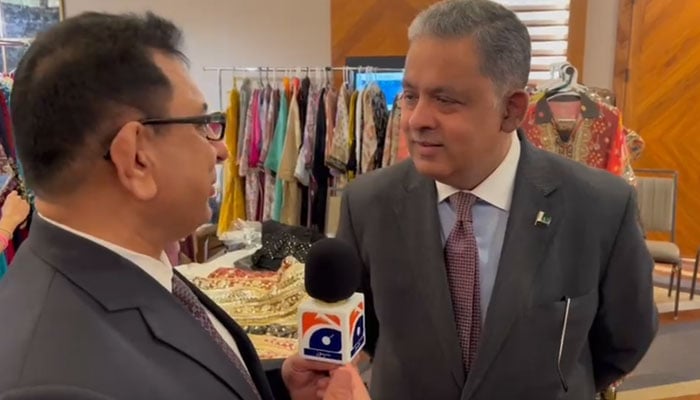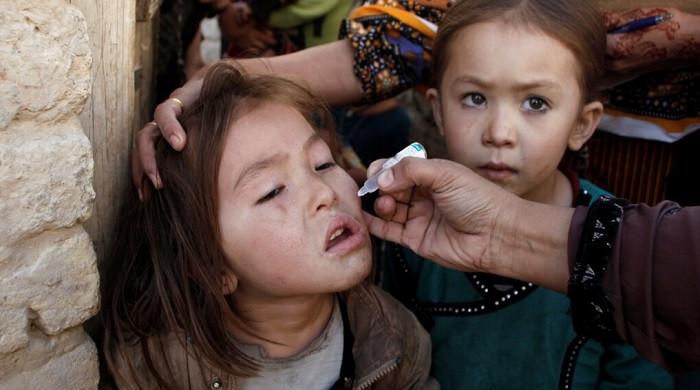Pakistan seeking flexibility in US tariff policy, says envoy
We hope that the matter can be resolved through dialogue, says Ambassador Rizwan
April 05, 2025

- Rizwan says new tariff applied to both Pakistan, India.
- Pakistan committed to contributing to global supply chains: envoy.
- "Domestic politics should remain within national boundaries."
Ambassador Rizwan Saeed Sheikh on Saturday asserted that Pakistan was making every effort to secure flexibility in the United States' new tariff policy to strengthen bilateral trade following what he described as a “positive” meeting with the US Assistant Trade Representative.
"We hope that the matter can be resolved through dialogue," the envoy said while speaking to Geo News during the APNA Spring Convention hosted by Pakistani-American doctors in Oklahoma.
US President Donald Trump imposed a staggering 29% tariff on imports from Pakistan.
The US remains Pakistan’s top export destination, and according to the State Bank of Pakistan, total exports to the US during the fiscal year 2023-24 amounted to $5.44 billion.
This unprecedented levy, part of the most aggressive US trade policy in almost a century, has rattled global markets and put emerging economies on edge.
For Pakistan, whose textile industry heavily relies on exports to the US, this tariff is more than just a financial setback — it’s a direct hit to its economic backbone.
The country of over 240 million people now faces a 29% tariff (set to begin on April 9) on its exports to the US, significantly higher than the 10% baseline, which came into effect on April 5 (today).
Speaking to Geo News today, the ambassador said that the new tariff system was based on a formal structure that applies uniformly to all countries.
"However, since each country’s exports, products, and trade volumes vary, the effects of this policy also differ accordingly. The tariffs have been applied to both Pakistan and India, but at different rates," he noted.
He clarified that the US is an enormous market — so large that no single country, or even a few combined, can fulfill its demands. "Various countries, particularly those in South Asia such as Pakistan and India, supply products to help meet this demand."
He emphasised that this policy falls under the discretion of the US government, especially President Trump, who aims to promote local industries and create more employment.
Rizwan also said that drawing comparisons between the impacts on Pakistan and India is misleading, noting that each country has distinct products, capabilities, and strategic goals. “India may have a stronger IT sector, but Pakistan is also emerging. We must define our path based on national interests and capacity,” he added.
Commenting on Pakistan’s trade potential, Sheikh said the US remains a vast and open market, and Pakistan is committed to contributing to global supply chains through its unique offerings. “We are a sovereign nation of 240 million. Our international relations must be guided by our own merit,” he said.
Addressing recent social media speculations involving Pakistani-American PTI supporters, Sheikh stressed the importance of respecting US laws. “If someone violates American law, it should be addressed through legal means. As an ambassador, my role is to uphold and respect both domestic and international law,” he stated.
Regarding a bill introduced in the US Congress that allegedly targets Pakistan, the ambassador said: “Thousands of bills are introduced every year — few become law. The Pakistan-US relationship is long-standing and strong,” he said, adding that President Trump even mentioned Pakistan in a positive light during his inaugural address, calling it a sign of goodwill.
On the presence of PTI-affiliated movements in the US, Sheikh reiterated that domestic politics should remain within national boundaries. “Like any country, Pakistan reserves the right to handle its internal affairs independently. We do not support foreign interference,” he said.
He concluded by asserting Pakistan’s resilience and sovereignty. “We have stood firm in one of the world’s toughest regions for 77 years. We know how to address our issues and defend our national integrity.”











